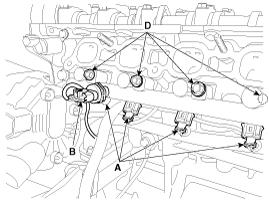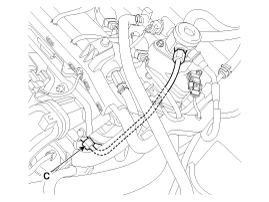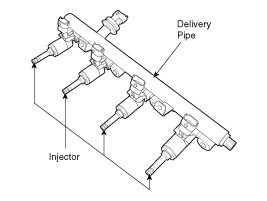|
In case of removing the high pressure fuel
pump, high pressure fuel pipe, delivery pipe, and injector, there
may be injury caused by leakage of the high pressure fuel. So don’t
do any repair work right after engine stops.
|
| 1. |
Turn the ignition switch OFF and disconnect
the battery negative (-) cable. |
| 2. |
Release the residual pressure in fuel
line.
(Refer to Fuel Delivery System - “Release
Residual Pressure in Fuel Line”)
| •
|
When removing the fuel pump relay,
a Diagnostic Trouble Code (DTC) may occur. Delete the
code with the GDS after completion of “Release Residual
Pressure in Fuel Line”
work. | | |
| 3. |
Remove the intake manifold.
(Refer to Engine Mechanical System - "Intake
And Exhaust System") |
| 4. |
Disconnect the injector connectors (A) and the
rail pressure sensor connector (B). |
| 5. |
Remove the high pressure fuel pipe
(C). |
| 6. |
Remove the engine oil
gauge. |
| 7. |
Remove the installation bolt (D), and then
remove the delivery pipe and injector assembly from the
engine.



|
| •
|
Do not use already used injector fixing
clip
again. | |
|
Do not reuse the support disc.
Do not reuse the injector rubber
washer.
Do not reuse the combustion
seal. |
| •
|
Install the component with the specified
torques. |
| •
|
Note that internal damage may occur when
the component is dropped. In this case, use it after
inspecting. | |
| •
|
Apply engine oil to the injector
O-ring. |
| •
|
Do not use already used injector O-ring
again. | |
| •
|
Do not use already used bolt
again. | |
| •
|
When insert the injector, be careful not
to damage the injector tip.
| |
| 1. |
Installation is reverse of
removal.
Delivery pipe
installation bolt:
18.6 ~ 23.5 N.m (1.9 ~ 2.4 kgf.m, 13.7 ~
17.4 lb-ft)
High pressure
fuel pipe installation nut:
26.5 ~ 32.4 N.m (2.7 ~ 3.3 kgf.m, 19.5 ~
23.9 lb-ft)
| | |